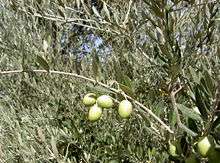Definify.com
Webster 1913 Edition
Olive
1.
(Bot.)
(a)
A tree (
Olea Europaea
) with small oblong or elliptical leaves, axillary clusters of flowers, and oval, one-seeded drupes. The tree has been cultivated for its fruit for thousands of years, and its branches are the emblems of peace. The wood is yellowish brown and beautifully variegated. (b)
The fruit of the olive. It has been much improved by cultivation, and is used for making pickles. Olive oil is pressed from its flesh.
2.
(Zool.)
(a)
Any shell of the genus
Oliva
and allied genera; – so called from the form. See Oliva
. (b)
The oyster catcher.
[Prov. Eng.]
3.
(a)
The color of the olive, a peculiar dark brownish, yellowish, or tawny green.
(b)
One of the tertiary colors, composed of violet and green mixed in equal strength and proportion.
5.
(Cookery)
A small slice of meat seasoned, rolled up, and cooked;
as,
. olives
of beef or veal☞ Olive is sometimes used adjectively and in the formation of self-explaining compounds; as, olive brown, olive green, olive-colored, olive-skinned, olive crown, olive garden, olive tree, olive yard, etc.
Ol′ive
,Adj.
Approaching the color of the olive; of a peculiar dark brownish, yellowish, or tawny green.
Webster 1828 Edition
Olive
OL'IVE
,Noun.
A plant or tree of the genus Olea. The common olive tree grows in warm climates and rises to the height of twenty or thirty feet, having an upright stem with numerous branches. This tree is much cultivated in the south of Europe for its fruit, from which is expressed the olive oil, and which is used also for pickles.
Definition 2026
Olive
Olive
See also: olive
English
Proper noun
Olive
- A female given name.
- 1842 Alfred Tennyson, The Talking Oak:
- And hear me swear a solemn oath, / That only by thy side / Will I to Olive plight my troth, / And gain her for my bride.
- 1850 Dinah Craik, Olive, Chapman and Hall, page 26:
- "Elspie, I have a thought! The baby shall be christened Olive!"
- "It's a strange, heathen name, Mrs. Rothesay."
- "Not at all. Listen how I chanced to think of it. This very morning, just before you came to waken me, I had such a queer, delicious dream. [ - - - ] Then I looked up, after awhile, and saw standing at the foot of the bed a little angel—a child-angel—with a green olive-branch in its hand. [ - - - ] "
- 2006 Alice Munro, The View from Castle Rock, Chatto & Windus, ISBN 0701179899, pages 227-228:
- There was Olive, a soft drowsy girl who didn't like me because I called her Olive Oyl. Even after I was made to apologize she didn't like me.
- 1842 Alfred Tennyson, The Talking Oak:
- A surname.
- (rare) A male given name.
Related terms
Anagrams
German
Pronunciation
Noun
Olive f (genitive Olive, plural Oliven)
- olive (fruit)
Derived terms
Derived terms
|
|
|
olive
olive
See also: Olive
English

Olea europaea (1)
Noun
olive (plural olives)
- An evergreen tree, Olea europaea, cultivated since ancient times in the Mediterranean for its fruit and the oil obtained from it.
- The small oval fruit of this tree, eaten ripe (usually black) or unripe (usually green).
- The wood of the olive tree.
- A dark yellowish-green color, that of an unripe olive.
-
olive colour:
-
- (anatomy) An olivary body, part of the medulla oblongata.
- A component of a plumbing compression joint; a ring which is placed between the nut and the pipe and compressed during fastening to provide a seal.
- (cooking) A small slice of meat seasoned, rolled up, and cooked.
- a beef olive
- olives of veal
- Any shell of the genus Oliva and allied genera; so called from the shape.
- (Britain, dialect) An oystercatcher, a shore bird.
Translations
olive tree — see olive tree
fruit
|
|
wood
colour
|
|
Derived terms
Terms derived from olive
|
|
|
Adjective
olive (comparative more olive, superlative most olive)
- Of a grayish green color, that of an unripe olive.
- 1907, Harold Edward Bindloss, chapter 22, in The Dust of Conflict:
- Appleby […] rose from his seat when Morales came in. He shook hands urbanely, unbuckled his sword, and laid his kepi on the table, and then sat down with an expression of concern in his olive face which Appleby fancied was assumed.
-
Translations
colour
|
|
Related terms
See also
- à la grecque
- Castile soap
- Gethsemane
- Wiktionary appendix of colours
References
- ↑ Radoslav Katičić, Ancient Languages of the Balkans, Part One (Paris: Mouton, 1976).